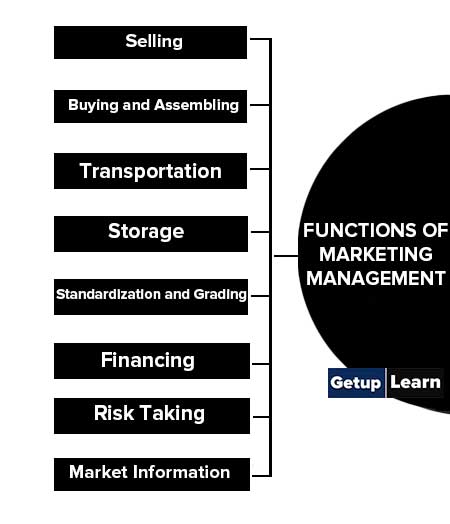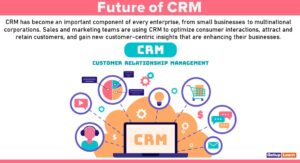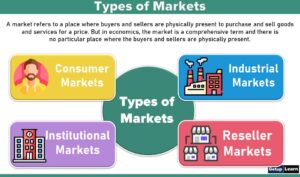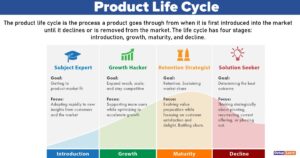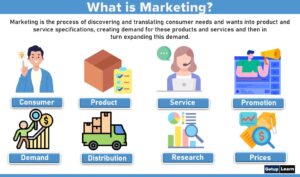Table of Contents
- 1 What is Marketing Management?
- 2 Definition of Marketing Management
- 3 Concept of Marketing Management
- 4 Philosophy of Marketing Management
- 5 Functions of Marketing Management
-
6 Importance of Marketing Management
- 6.1 Facilitates Exchange of Goods
- 6.2 Helps in Growth of Business
- 6.3 Helps in Right Product Positioning in Minds of Customers
- 6.4 Helps to Introduce New Products
- 6.5 Generates Employment
- 6.6 Marketing is Complex Set of Activities
- 6.7 Helps in Growth of Economy
- 6.8 Utilizes Excess Capacity of Business
- 6.9 Marketing Sometimes May Overpromise the Product Specifications to Generate Sales
- 6.10 Creates Competitive Advantage
-
7 FAQ Related to Marketing Management
- 7.1 What is the definition of marketing management?
- 7.2 What is the meaning of marketing management?
- 7.3 What is the concept marketing management?
- 7.4 What are the philosophies of marketing management?
- 7.5 What are the functions of marketing management?
- 7.6 What is the importance of marketing management?
What is Marketing Management?
Marketing Management is a functional area of business management that has to do with the broad problem of consumer satisfaction. Its main purpose or objective is to plan, organize and control the marketing activities of the concern in order to rely on the marketing goals.

In other words, Marketing management is a process by which goods and services are exchanged and their values are determined in monetary terms as to price. Simply stated, marketing is the activity the manufacturers deliberately undertake and by which they first try to understand the consumer needs and wants and then produce and supply the products for some amount of money.
Marketing management is simplistically defined as ‘putting the right product in the right place, at the right price, at the right time.’ Though this sounds like an easy enough proposition, a lot of hard work and research must go into setting this simple definition up.
And if even one element is off the mark, a promising product or service can fail completely and end up costing the company substantially.
Definition of Marketing Management
These are some definitions of marketing management by some authors:
Marketing management is the process of increasing the effectiveness/efficiency by which marketing activities are performed by individuals or organizations.
Ben M.En
Marketing management is the process of discovering and translating consumer needs and wants into product and service specifications, creating demand for these products and services and then in turn expanding this demand.
Hansen
Marketing management is defined as “a social and managerial process by which individual and groups obtain what they need and want through creating and exchanging products and value with other
Philip Kotler
Marketing is the activity, set of institutions, and processes for creating, communicating, delivering, and exchanging offerings that have value for customers, clients, partners, and society at large.
American Marketing Association
Marketing is both a social and managerial process by which individuals and organizations obtain what they need and want through creating and exchanging value with others, and it is also a process whereby companies engage customers, build strong customer relationships, and create customer value in order to capture value from customers in return.
Armstrong & Kotler
Marketing is the process by which a firm profitably translates customer needs into revenue.
Mark Burgess
Concept of Marketing Management
The concepts acquire different meanings when viewed from a different point of view, Marketing has been viewed differently by Economists, Engineers, and Corporate managers. Academicians and Sociologists. Following are the concepts of marketing management discussed below:
- Exchange Orientation
- Product Orientation
- Production Oreintation
- Sales Orientation
- Marketing Concept
- Standard of Living Orientation
- Utility Orientation
- Revenue Orientation
- Modern Concept of Marketing
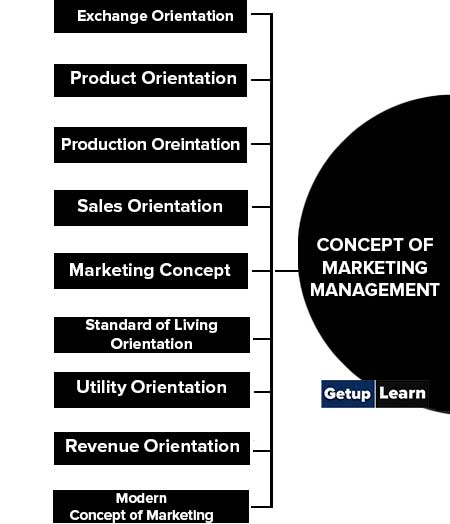
Exchange Orientation
Marketing involves the exchange of a product and service in lieu of money between a seller and a buyer, but modern marketing is not merely an exchange operation. Marketing has now gained a much wider connotation.
It covers the search for customers’ wants, formulation of marketing strategies, marketing mix, creative selling, and advertising, serving the customers, and so on. This exchange-oriented marketing approach has been enriched by a range of newer activities of marketing.
Product Orientation
A product orientation is a marketing management philosophy by promotes quality products to generate sales. The company assumes product quality as a determinant of demand in the market. They pay less attention to customer needs and wants.
Production Oreintation
According to this concept, the marketing department of a company is made to sell whatever is produced. The product line is usually narrow. The price is based on production and distribution costs. Technical research enables product improvement and cost-cutting in the production process.
Packaging is expected to protect the product and minimize cost credit is regarded as a necessary evil. The producer is interested only in minimizing bad debt losses. Promotion is adopted only to give emphasis on product features, quality, and price.
This concept can work only in a seller’s market. In a buyers market, it fails to retain its market under keen competition which has intensified in the present era of globalization of economies. No longer does any company enjoy absolute leadership in any market and it has to direct the marketing efforts in totality.
The products must be designed keeping in view the market’s requirements under consideration and marketing activities should be more aggressive and scientific and deserve adequate attention like production.
Sales Orientation
Buyers’ market for many commodities has brought about sales orientation in marketing. Those holding this viewpoint believe that a company cannot secure enough customer response to its products without high-pressure salesmanship, aggressive advertising, and intensive sales promotion.
Sales orientation gives emphasis on increasing sales volume even at the cost of consumer satisfaction and service. Many marketers adopt this approach in selling unsought or unwanted goods. The selling concept is found in the sale of books, insurance, auto sales, etc.
The selling concept at the time of elections is faithfully followed by all political parties. Sales orientation also exhibits marketing myopia because marketing is not merely selling.
Marketing Concept
When a marketer adopts a market-oriented business philosophy, the guiding principle becomes “it is more effective to make what customers want to buy than to sell them what a marketer wants to make or sell. “Thus, primary and coordination of all company activities rotate around the primary goal of satisfying customer needs.
The marketing concept is defined as a customer-oriented philosophy duly integrated and implemented throughout the entire organization in order to serve customers better than competitors and thereby ensure sustained growth and prosperity.
It was introduced as a marketing approach points out that the primary task of a business enterprise is to study the needs, desires, and wants of the potential customers, and on the basis of the latest and accurate knowledge of market demand, the enterprise must produce and offer the products which will give the desired satisfaction and services to the customers (much better than its competitors).
The essence of the marketing concept is that the customer and not the product shall be the center or the heart of the entire business system. It emphasizes a customer-oriented marketing process. All business operations revolve around customer satisfaction and service.
Standard of Living Orientation
This concept of marketing was developed by Paul Mazur who gave a sentimental definition of marketing. According to his viewpoint, “Marketing delivers of the standard of living to the society.” Though this concept of marketing is customer-oriented up to some extent but not a complete one.
Utility Orientation
The Utility 0rientation concept of marketing is an extension of the classical economic concept. According to this concept, marketing has been defined as the creation of time, place, and possession utilities. The definition of R.Buskirk can be put under this head, “Market is an integrated system of action that creates value in goods through the creation of place, time and ownership utilities.”
The concept of marketing brings the function of marketing the part of the production and other important economic functions but it is not consumer-oriented hence it cannot be accepted in modern times.
Revenue Orientation
According to this concept, Marketing is that activity that earns profit for the business. A marketing executive is concerned with the charging or remunerative prices which will contribute most to company profits. Thus, profit is the criterion by which the marketing manager should make his decisions.
However, in modern times, profit alone cannot be the corporate philosophy. The focus of most business organizations is on wealth maximization. The profits arise as a result of customer satisfaction and in order to achieve a high degree of customer satisfaction, the prices cannot be charged arbitrarily
The marketers have to study the value delivered by a product to the customer and then decide the price to be charged. So, revenue orientation can be an additional motive of business, but relying totally on the same will yield the company uncompetitiveness in the long run.
Modern Concept of Marketing
The modern approach to marketing is a social and customer-oriented approach and lays emphasis on consumer satisfaction. The modern concept of marketing is one that starts with the identification and interpretation of consumers’ needs and desires, both qualitatively and quantitatively.
This customer orientation follows through with all the business activities involved in the flow of goods and services from producer to consumers and ends with those services necessary to aid the consumer in getting the expected utility from the products he has purchased.
Philosophy of Marketing Management
There are five concepts under which organizations conduct their marketing activities. These are the five philosophies of marketing management explained below:
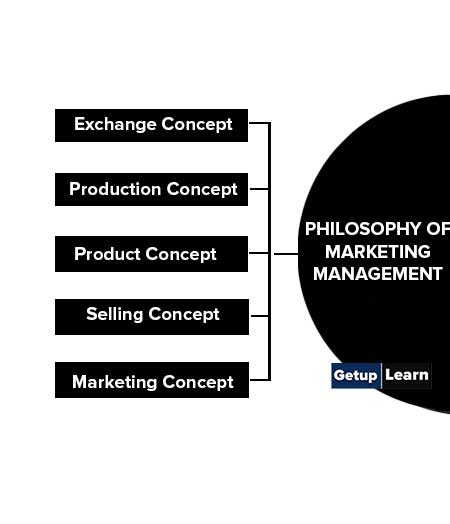
Exchange Concept
This concept holds the central idea in marketing is an exchange, exchange of products between the seller and the buyer. Some firms operate with the idea that marketing is simply a matter of giving a product to someone in exchange for money.
Marketing is broader than exchange. Marketing includes concern for customers, generation of value satisfaction, creative selling, and integrated action for serving the customer. Exchange covers the physical aspects and the price mechanism involved in marketing. Exchange concepts are the least evolved view on marketing.
Production Concept
This is the oldest concept guiding sellers. In this concept, the firm believes that business can be managed by maximizing production so that the unit cost of the product will be low. The firm works on the MANTRA “Maximising output, with the lower unit cost and selling the product to the customer with a low price”.
Here production dominates and marketing is given less importance. It is assumed that the low price of the product will attract the customer. In practice, however, it does not happen because customers are motivated by various other factors other than price.
Product Concept
In this concept, consumers will prefer the product that offers quality, performance, new products, ideally designed and engineered products, and innovative features. Managers in these product-oriented organizations achieve success by focusing their energy on making superior products, emphasis on quality assurance, and product attributes.
They spend most of their time and money on research and development and bring out many products. They produce quality products but fail to determine consumer needs and satisfaction. Hence this cannot achieve great marketing success.
Selling Concept
In this concept, firms believe that the main marketing concern is to aggressively push the product and persuade the customer to buy the offered product. However, the consumer will only buy the product if the organization undertakes a large-scale selling, heavy advertising, extensive sales promotion, and substantial price discounts as the tools of sales concepts. The concept is unlikely to succeed as it assumes that selling is synonymous with marketing.
Marketing Concept
There are firms that believe that the customer is central to their business. This concept holds that achieving the organizational goals depends on determining the needs and wants of target markets and delivering the desired satisfactions more effectively and efficiently than the competitors do.
Functions of Marketing Management
The marketing department in any business executes certain activities to facilitate movement from the manufacturers to consumer. Most of these activities are to be performed with the utmost care by each and every company so that its marketing results in profitability.
We need to know the major functions of marketing management so as to realise and condition our business. Below are some of the important functions of marketing management:
- Selling
- Buying and Assembling
- Transportation
- Storage
- Standardization and Grading
- Financing
- Risk Taking
- Market Information
Selling
Selling is the essence of marketing. It involves persuading the prospective consumers to make purchases. It includes transfer of title of goods manufacturers to the buyer. Selling plays a vital part in realizing the ultimate aim of profitability for the business.
Selling includes personal selling, advertising, publicity, and sales promotion. Effectiveness and efficiency in selling decide the magnitude of the firm’s profitability.
Buying and Assembling
Business has to decide on quantity, quality, sourcing, time of purchase, price etc. Business makes purchase to drive sales or to reduce costs. Purchasing intermediaries are much enticed by quality, service, and price. The products that the retailers buy for resale are picked as per the requirements and tastes of their customers.
Assembling refers to buying required components and fitting them together to construct a product. ‘Assembly line’ defines a production line consisting of purely assembly functions. The assembly operation consists of individual component, parts at the work place and sending these parts for compilation.
Assembly line is a system of employees and machines in which each employee has a particular role and the work is passed right from one employee to the next until the product is thoroughly compiled.
Transportation
Transportation is the physical movement of goods and raw materials from the places where they are manufactured or procured to those places where they are needed for consumption or further processing. It creates location convenience. Transportation is crucial from the sourcing of raw materials to the delivery of finished products. Transportation includes mainly on railroads, trucks, waterways, pipelines and airways.
Storage
Storage refers to holding of products in proper, i.e., functional or serviceable, condition from the time they are produced until they are required by customers in case of finished products or by the production department in case of raw materials and stores. Storing safeguard the products from decay and helps in carrying over excess for future consumption or usage in production.
Standardization and Grading
Standardization refers setting up of definite standards or classification for products based on the native physical qualities of any item. This may include quantity weight and size or quality like shade, form, appearance, material, taste, etc.
Setting a benchmark gives rise to uniformity of products. Grading means the classification of standardized products into certain well-defined brackets or groups. It includes the division of products into separate categories having similar features of size and quality.
Grading is crucial in raw materials; agricultural produce like wheat and cereals; mining products like coal, iron and manganese and forest products like timber industries.
Financing
Financing involves the usage of the funds to meet the financial needs of organization dealing with various activities of marketing. Business must ensure uninterrupted flow of credit. Further the costs of getting merchandise into the hands of the customers are largely referred to as the finance function in marketing.
Financing in business have several needs like finance for the working capital and fixed capital, which may be procured from three sources owned capital, loans and advance & trade credit. In other words, different kinds of finances are short-term, medium-term, and long-term finance.
Risk Taking
Risk means probability of loss due to some unexpected situations. Risk bearing in marketing means the capacity of a business to indulge in the ownership of goods held for unexpected demand, including the future losses because of decrease in prices and the losses from breakdown, depreciation, antiquation, natural calamities like floods, fire, pandemics or any other loss that may occur with the passage of time.
They may also be due to decomposition, deterioration and accidents or due to variation in the prices induced by changes in supply and demand. The various risks are generally termed as place risk, time risk, physical risk, etc.
Market Information
The significance of marketing information as one of the functions of marketing management is recently noticed. The sole foundation on which marketing decisions rely is timely and accurate market information. Business is driven by data regarding needs and wants of its current and prospective customers and the macro level changes in the economy.
Importance of Marketing Management
These are the importance of marketing management given below:
- Facilitates Exchange of Goods
- Helps in Growth of Business
- Helps in Right Product Positioning in Minds of Customers
- Helps to Introduce New Products
- Generates Employment
- Marketing is Complex Set of Activities
- Helps in Growth of Economy
- Utilizes Excess Capacity of Business
- Marketing Sometimes May Overpromise the Product Specifications to Generate Sales
- Creates Competitive Advantage
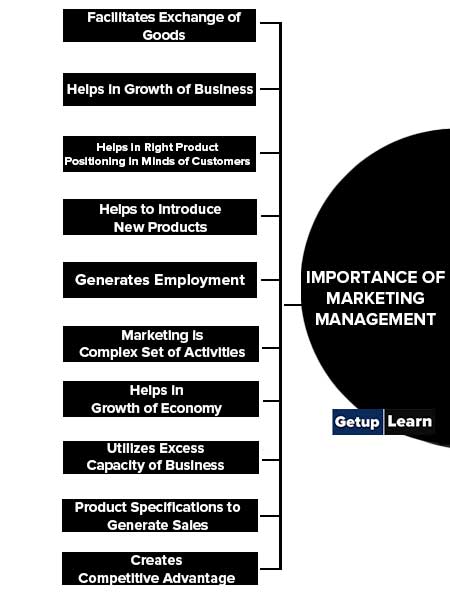
Facilitates Exchange of Goods
Marketing ensures goods are available to end consumers from the producers Uninterrupted and at a reasonable price and quality. Even though the supplier of the product may have a sound production system. Marketing is critical for making it reach to end user. Without marketing, it will take a lot of time to reach or may not reach adequately.
Helps in Growth of Business
Marketing creates the demand for the products thereby boosting productivity and making the business profitable. Moreover, it may also open up new avenues for business leading to exponential growth of the business.
Helps in Right Product Positioning in Minds of Customers
Marketing generates awareness regarding actual usage of the product by giving demonstrations regarding how to use it through personal selling, advertisement, etc. the product is positioned in the minds of customers.
Helps to Introduce New Products
Marketing educates the end user about the product and encourages them to buy the product which they will not buy otherwise. Hence aggressive advertisement, celebrity endorsement etc. induce impulsive buying behaviour by customers. In the era of moment marketing when business create innovative products related to what customers are already looking for.
Generates Employment
Marketing activities include various activities right from procurement to the delivery of products to end consumers. All these activities requires human interventions with various departments of the business without which it is impossible to generate business. Marketing creates the pressure to supply chain management and achieved required target results in overall economic growth and Employment to many related sectors.
Marketing is Complex Set of Activities
Marketing consisting of procurement, supply, finance, transport, warehousing Buying and Assembling, Storage, Standardization and Grading, Information gathering etc. In order for business to run smoothly business to ensure all these activities are running smoothly.
Helps in Growth of Economy
Marketing raises the standard of living to the community by providing large scale employment opportunity, better quality goods and services at competitive prices. Hence marketing rightly sets the pace of economic development in the country.
Utilizes Excess Capacity of Business
By making a business reach its Optimum capacity marketing utilizes the excess capacity of the business. Business may also diversify it’s production capabilities in various segments once the existing product lines are well established. Thus marketing scales up business activities.
Marketing Sometimes May Overpromise the Product Specifications to Generate Sales
It may also hide some faults of products through excessive marketing. Eg Publicity, celebrity endorsement etc makes customers belief that product is actually of same quality as shown in advertisement.
Creates Competitive Advantage
Even though sometime marketing may overpromise nonetheless it is an important determinant in generating goodwill for the company. By engaging in cause related marketing, raising social awareness, customer feels that the businesses actually cares which results in rising share prices and growth for the business. These factors also create an edge over its competitors and a product differentiation in the eyes of its customers.
What is the definition of marketing management?
Marketing is the activity, set of institutions, and processes for creating, communicating, delivering, and exchanging offerings that have value for customers, clients, partners, and society at large. By American Marketing Association
What is the meaning of marketing management?
Marketing management is defined as “a social and managerial process by which individual and groups obtain what they need and want through creating and exchanging products and value with other.
What is the concept marketing management?
Following are the concepts of marketing discussed below:
1. Exchange Orientation
2. Product Orientation
3. Production Oreintation
4. Sales Orientation
5. Marketing Concept
6. Standard of Living Orientation
7. Utility Orientation
8. Revenue Orientation
9. Modern Concept of Marketing.
What are the philosophies of marketing management?
Following are the five philosophies of marketing management explained below:
1. Exchange Concept
2. Production Concept
3. Product Concept
4. Selling Concept
5. Marketing Concept.
What are the functions of marketing management?
Following are some of the important functions of marketing management:
1. Selling
2. Buying and Assembling
3. Transportation
4. Storage
5. Standardization and Grading
6. Financing
7. Risk Taking
8. Market Information.
What is the importance of marketing management?
Importance of Marketing Management:
1. Facilitates Exchange of Goods
2. Helps in Growth of Business
3. Helps in Right Product Positioning in Minds of Customers
4. Helps to Introduce New Products
5. Generates Employment
6. Marketing is Complex Set of Activities
7. Helps in Growth of Economy
8. Utilizes Excess Capacity of Business
9. Marketing Sometimes May Overpromise the Product Specifications to Generate Sales
10. Creates Competitive Advantage.

